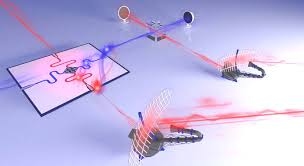
Breaking News
 Hillary Clinton Breaks With Party Line, Admits Mass Migration Is "Disruptive & Destabilizing
Hillary Clinton Breaks With Party Line, Admits Mass Migration Is "Disruptive & Destabilizing
 Media Freedom…if We Can Keep it!
Media Freedom…if We Can Keep it!
 A Weird Obsession - and a Strange Duality
A Weird Obsession - and a Strange Duality
 Debt, Inflation, and the Illusion of Protection
Debt, Inflation, and the Illusion of Protection
Top Tech News
 New Spray-on Powder Instantly Seals Life-Threatening Wounds in Battle or During Disasters
New Spray-on Powder Instantly Seals Life-Threatening Wounds in Battle or During Disasters
 AI-enhanced stethoscope excels at listening to our hearts
AI-enhanced stethoscope excels at listening to our hearts
 Flame-treated sunscreen keeps the zinc but cuts the smeary white look
Flame-treated sunscreen keeps the zinc but cuts the smeary white look
 Display hub adds three more screens powered through single USB port
Display hub adds three more screens powered through single USB port
 We Finally Know How Fast The Tesla Semi Will Charge: Very, Very Fast
We Finally Know How Fast The Tesla Semi Will Charge: Very, Very Fast
 Drone-launching underwater drone hitches a ride on ship and sub hulls
Drone-launching underwater drone hitches a ride on ship and sub hulls
 Humanoid Robots Get "Brains" As Dual-Use Fears Mount
Humanoid Robots Get "Brains" As Dual-Use Fears Mount
 SpaceX Authorized to Increase High Speed Internet Download Speeds 5X Through 2026
SpaceX Authorized to Increase High Speed Internet Download Speeds 5X Through 2026
 Space AI is the Key to the Technological Singularity
Space AI is the Key to the Technological Singularity
 Velocitor X-1 eVTOL could be beating the traffic in just a year
Velocitor X-1 eVTOL could be beating the traffic in just a year
"Quantum radar" uses entangled photons to detect objects

Quantum entanglement describes the bizarre state where two particles can become linked so tightly that they seem to communicate instantly, no matter how far apart they are. Measuring the state of one particle will instantly change the state of the other, hypothetically even if it's on the other side of the universe. That implies that the information is moving faster than the speed of light, which is thought to be impossible – and yet, it's clearly and measurably happening. The phenomenon even unnerved Einstein himself, who famously described it as "spooky action at a distance."
While we still don't entirely understand why or how it works, that's not stopping scientists figuring out ways to use it to our advantage. Strides are being made towards creating quantum computers and a quantum internet, both of which would be super fast and nigh-unhackable. And now, in a new study by physicists at the Institute of Science and Technology Austria (IST Austria), MIT and the University of York, the phenomenon been applied to radar.



